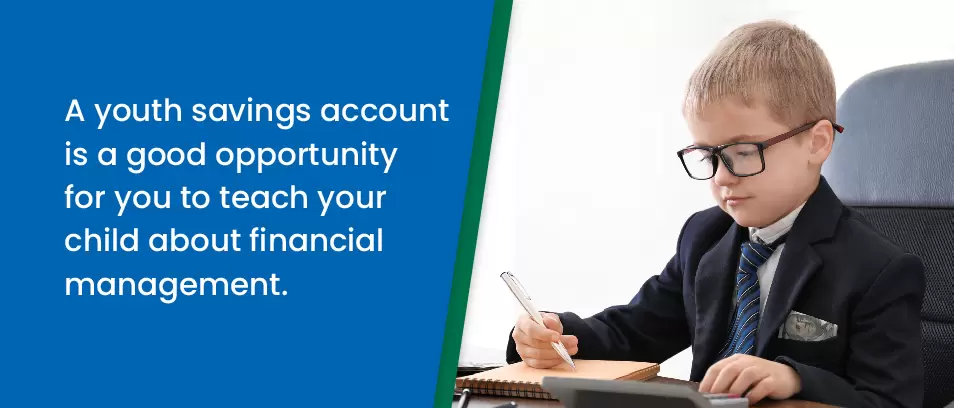As a parent of young children, you may not be thinking too hard about their financial future when your days are filled with running around a playground, changing diapers, or doing the school run.
But putting money aside for your children, into their own accounts, is one of the best ways that you can set them up for financial success as adults. Whether it’s an opportunity to take advantage of compound interest, or simply a place to stash birthday or holiday checks, it’s best to be prepared and make plans as soon as possible.
Not sure where to start? Here’s a run-through of financial accounts that you can set up for your child, along with some guidance on when and how to fund them.

529 College Savings Plan
Saving for college is usually the first type of child savings account that parents think of. 529 accounts work in a similar way to a 401(k) retirement account, where the funds are tax-deferred. The bonus here is that, if the money is used for education expenses like tuition and books, those withdrawals can be made tax-free.
Any growth funds that accumulate on the account are also tax-free. If there’s anything left in the account once your child graduates or if they choose not to attend college at all, you can rename the beneficiary and pass the balance onto your next child.
529 savings plans are administered by your state. You won’t be able to deduct contributions on your federal tax returns, but you will be able to on your state ones. There’s also no federal limit on contributions and state limits are high. Even the lowest are usually around $235,000 per beneficiary. This means that, if your income increases as your child grows up, so too can the amount you’re putting aside for their education.
It’s never too early to start a 529 account. Investing in this type of student savings account from when your child is a newborn is a great way to ensure that they have enough money to cover their college expenses once they turn 18. Putting aside $1,000 a year until they finish high school could mean that they have over $50,000 waiting for them to put towards college expenses.
Savings Bonds
Savings bonds are offered through the U.S. Treasury Department–it’s essentially like you’re loaning the government money by purchasing the bond, which they then agree to pay you back after a fixed amount of time with interest included. There’s no state or local taxes due on the interest, and you can defer the federal interest until the bond matures.
Bonds can be bought online and make for great gift ideas for grandparents or family friends. They can even be used as a high school or college graduation present so that your child has a pot of money to pull from in their mid-to-late twenties.
Savings bonds are a low-risk investment and the prices don’t fluctuate with the stock market. They can be purchased to expire anywhere from one to 30 years, so taking these out when your child is young or in middle school would give you a good amount of time to accrue some interest funds. Cashing out the matured bonds when they turn 18 means that they’ll then have some money to take to college or into their working life.

Youth Savings Account
A youth savings account can be opened for your child at any time. These are useful to have for any small monetary gifts that they may receive that you don’t want to put towards a more formal savings plan like a 529 or IRA.
Saving for life’s bigger expenses in a different account may earn them more in return. But having a youth savings account is a good opportunity for you to teach your child about financial management.
They’ll still receive interest on their funds in a regular savings account, especially if you open it when they’re young. They’ll also have access to those funds whenever they want, which makes this type of account a good step up from a piggy bank to a more grown-up alternative for their personal savings.
Youth Checking Account
Similarly, a youth checking account is a good chance to share important financial lessons with your child. With Palisades Credit Union, anyone over the age of 13 can open a student checking account to store their allowance or first-job paychecks and make purchases using a debit card.
This type of account, paired with a savings account, is a must for college students too. They’ll need to have access to a debit card once they’re away from home and at school, so setting something up before they head off to campus is always a smart move.
Once your child turns 21, they’ll be able to move the funds in their youth checking account to a traditional checking or savings account. This will give them access to some of the best savings rates in Rockland and Bergen County, so that they can make more from their existing money.
Certificates
A savings certificate is a special type of long-term savings account with a fixed withdrawal date. They can mature anywhere from a few months to 5 years, so you have plenty of options for when you want to take one out for your child. A 4-year certificate, for example, could be opened when your child starts high school so that it matures upon their graduation.
Returns are typically higher with certificates than savings, checking, or money market accounts and the interest rate is fixed for the life of the account. They make a great gift for children at milestone birthdays or for graduations as you can make deposits as low as $500 to get started.

IRA Retirement Account
Thinking about your child’s retirement when you haven’t even reached your own is often the furthest thought from a parent’s mind. Most people don’t begin their own retirement savings until after graduating college, when they start a job that offers a 401(k).
But if your child is already working throughout their teen years, they’re able to contribute to their own IRA account, or you can contribute on their behalf. Roth IRA’s are typically the best choice for teens and young adults when their earnings are low, particularly as the contribution limits are only $6,000 per year.
Once they have an IRA, they’re able to benefit from tax-free growth and can make tax-free withdrawals once they reach 59 ½. They can also use the funds before retirement with a penalty, or for free if the money is being used for educational expenses (much like a 529).
Credit Cards
Once your child turns 18, they’ll be eligible to open their own credit card account. There are pros and cons that come along with this, but it’s a good opportunity for you to teach them about responsible credit usage.
Having a credit card is one of the best ways to build up their credit score, alongside any student loans that they might have. When they’re ready to buy a home one day, this lengthy credit history will be incredibly helpful.
Be sure to teach them about making their payments on time and in full if possible, along with information about the interest they’ll have to pay if they carry a balance on their credit card from month to month.
Brokerage Accounts
Stocks
It’s not uncommon for parents or other relatives to buy stock certificates for a child in their family. Many of the world’s biggest companies still give out actual certificates, which can be a fun way for a child to show that they’re a shareholder in one of their favorite brands.
You can easily buy or sell shares for your child, but there it’s important to be aware that individual stocks do come with some risks. These are typically more volatile than a collective portfolio, so there is the potential to lose money with stocks. You’re also only able to purchase these through the company directly, so fees are often higher than with a brokerage firm.
Custodial Brokerage Accounts
For funds with more spending freedom, a custodial brokerage account is often a good choice when thinking about savings for children. You may see these referred to as a Uniform Transfers/Gifts to Minors Act (UTMA or UGMA) account. They give you the option to invest in a number of bonds, stocks, and mutual funds on your child’s behalf, with the ability to purchase specific individual bonds within this.
The funds in a custodial brokerage account can be used for any expenses that benefit the child beneficiary, not just educational ones. That means their sports team or even everyday needs like clothing can all be covered with this money.
The beneficiary on these accounts can’t be changed, which means that you can’t transfer funds to a sibling or someone else in the family. The upside to this, though, is that your child will have full control of the account once they reach 18-25, depending on your state regulations.
One important caveat to these types of accounts is that they’re not insured by the brokerage or a financial institution. That means that you could ultimately lose money.

Kickstart Your Child’s Financial Future
Set your child up for financial wealth as an adult by opening a checking or savings account for them today. At Palisades CU, our teams in Nanuet, New City and Orangeburg are here to help you find the right solution for your fiscal goals. Contact us or visit one of our convenient locations in Nanuet, New City, and Orangeburg to start saving for your child’s future.
« Return to "Blog"
